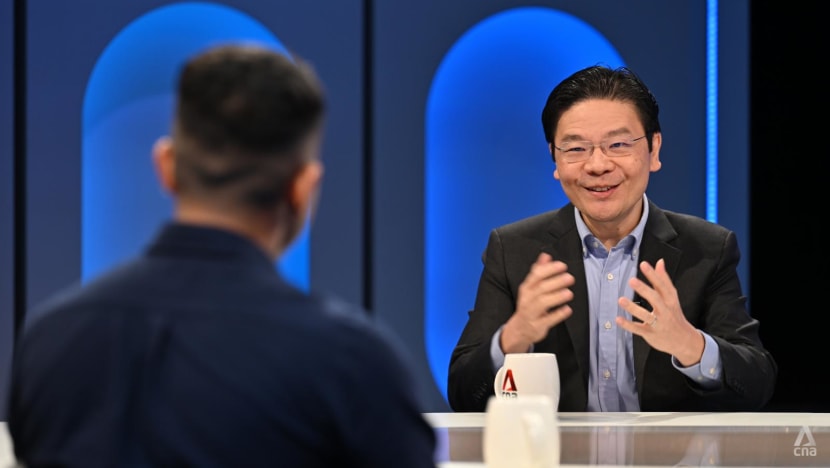Closure of Special Account in line with CPF's purpose and intent: Lawrence Wong
Deputy Prime Minister Lawrence Wong addressed the move to close the CPF Special Account for those aged 55 and older and the reactions it drew online, on CNA's Ask the Finance Minister show.

Deputy Prime Minister and Finance Minister Lawrence Wong speaking with panellists on CNA's Ask the Finance Minister programme on Feb 21, 2024. (Photo: CNA/Jeremy Long)

This audio is generated by an AI tool.
SINGAPORE: Measures announced at Budget 2024 affecting Central Provident Fund (CPF) members are “very much in line with the purpose and intent of the CPF”, said Finance Minister Lawrence Wong on Wednesday night (Feb 21).
Mr Wong, who is also Deputy Prime Minister, was addressing the move to close the CPF Special Account and the reactions it drew online.
Those aged 55 and above will no longer have a Special Account from 2025 onwards, but they will be able to put more money into their Retirement Accounts.
The Ordinary Account holds funds that can be withdrawn for housing and earns short-term interest rates, while the Special Account is for long-term purposes and so has a higher interest rate.
“That’s the principle,” explained Mr Wong on CNA’s Ask the Finance Minister show, a post-Budget panel discussion that saw him field questions from four panellists.
“Of course, at age 55, you also have a Retirement Account. So instead of now having Special Account and Retirement Account, we are streamlining it into just one, which is the Retirement Account, which is for the long-term, for your retirement needs.”
Under the move, CPF members who have excess funds in their Special Account can transfer it to the Retirement Account – “all the way up to the revised Enhanced Retirement Sum and still earn the same interest rate as the Special Account”, said Mr Wong.
“The vast majority of Singaporeans will be able to do so. And if they do so, they will get more in their Retirement Account. And eventually when they retire, they will get higher CPF payouts for life.”
The Enhanced Retirement Sum is the maximum amount that CPF members can put into their Retirement Accounts to receive payouts. It is currently set at three times the Basic Retirement Sum (BRS), but will be increased to four times the BRS next year.
Those who have remaining Special Account savings after hitting the Enhanced Retirement Sum cap will have these savings transferred to their Ordinary Account.
EMPLOYERS MUST HELP MID-CAREER WORKERS RESKILL, UPSKILL
Mr Wong on Wednesday also touched on how employers should help their mid-career employees, particularly those aged 40 and above, reboot their skills.
This group of Singaporeans will get S$4,000 (US$2,970) top-up in their SkillsFuture Credit, which can be used for select courses to boost their employability.
He acknowledged that some companies might not want to give their employees time off to pursue such courses, but said the government will continue to work closely across different industries with unions.
This includes engaging with companies individually and setting up company training committees, among a range of additional support for employers.
While there will be a few companies that take “a bit longer” to get on board, the market will “sort itself out because individuals will know where the better employers are and they will want to gravitate towards these employers”, Mr Wong noted.
“And the ones who don’t change will feel the pressure, hopefully through market competition, to up their HR (human resource) practices, and improve their employment practices and support their staff in training.”
Even though employers who embrace this new mindset may experience higher-costs in the short-term as they have to invest in their workers’ training, Mr Wong believes they will emerge “much better” as a company.
“I’m sure this has been proven time and again – that the more progressive employers, the ones who have moved, can already see the benefits. And hopefully more can see this is the way forward, and more companies and employers will join them.”
INSTITUTIONS ADAPTING TO ADULT LEARNERS
To improve wages across all professions, Institute of Technical Education (ITE) graduates will get two top-ups to pursue higher education.
The first is S$5,000 in their post-secondary education accounts when they enrol in a diploma programme. The second, given when they attain a diploma, is S$10,000 in their CPF Ordinary Account.
But the challenge would be for Institutes of Higher Learning (IHLs) and employers to welcome these students, some panellists highlighted on Wednesday.
In response, Mr Wong said IHLs are “adapting”, and believes they will be able to take on board these adult learners.
“Some of them will be fresh grads from the ITE going straight to polytechnic, but some will be a bit older. And the polytechnics, the ITE themselves will, I'm sure, be able to take them on board and make sure that the curriculum is suitable for their needs,” he said.
He added that the range of offerings is now much wider, with ITEs also offering their own technical diplomas and work-study diplomas “together with a growing pool of companies that are very keen to have these students come on board, work with them and study at the same time”.
RAMPING UP SUPPLY OF PRESCHOOLS
Mr Wong also acknowledged the need for more preschool centres, and reassured panellists that the government is working to increase supply.
“There is some tightness in some estates, particularly young estates with many young parents. And so we have to have more centres. We are doing so, but it takes time. We are really ramping up the supply,” he said.
He pointed to “large-scale” preschools in Punggol and Woodlands, and said the government will aim to build more such centres.
One of the constraints, however, is getting enough teachers – from preschool teachers to carers in infant care centres, added Mr Wong.
“We are ramping up the training as well, and hopefully over time we will be able to fill the gaps. But it’s something that we are aware of and we are doing our best to catch up with the demand.”
Other childcare measures announced at Budget include family support for lower-income households to make preschools more affordable.
Ultimately, the government wants to ensure that whatever support provided is “fiscally sustainable”, noted Mr Wong.
“And the best way to ensure that is to maintain our current system of fiscal discipline and responsibility; maintain a balanced Budget – which is what we are continually striving to do.”
Government schemes should be designed so they don’t lead to “inadvertent consequences” that can be seen happening in other places, the Finance Minister pointed out.
“We don’t want to diminish the ethos of self-reliance and individual efforts. There’s a lot to be cherished in that kind of ethos of responsibility – both at the individual level and at the family level – and we will continue to design our schemes to encourage that.”




















